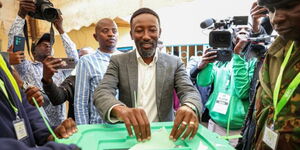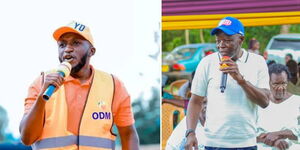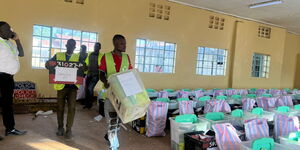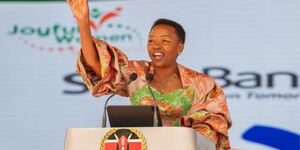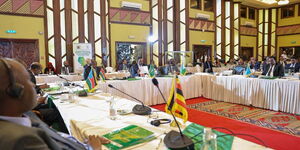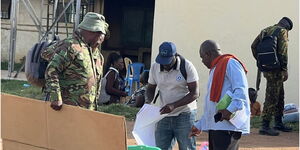Throughout its 15-year history, the Safaricom Foundation has transformed thousands of lives through impactful community investments under its strategic and development-oriented programs.
At the beginning of 2018, the foundation set out several objectives including attainment of healthy lives, equitable quality education opportunities, full and productive employment and decent work for young Kenyans.
The Foundation articulated three strategic directions for the period 2018 to 2021 condensed in Afya, Elimu and Wezesha thematic areas geared towards having a higher impact on society.
This turnaround has since brought about a remarkable project dubbed Uzazi Salama in Samburu County.
The program marks a successful partnership with local communities and other organizations to improve access to comprehensive, quality health care services. It has seen an improvement of maternal, neonatal and child healthcare in the county.
Meeting the goal of reducing the mortality rate and make sure women across the country have safe deliveries has been a major milestone for the Safaricom Foundation.
In line with medical provision, the foundation sponsored free medical camps in various parts including Karanda Primary, Ahero (Kisumu), Mwembeni Bush, Shanzu (Mombasa), Busia Town, Huruma Grounds (Eldoret), Kinoru Dispensary grounds (Meru), donated dialysis machines to Homa Bay General Hospital, the Coast General Maternity Reception and High Dependency Unit.
Wezesha program, on the hand, aims at equipping young Kenyans with relevant skills to enable them gain employment and uplift themselves on successful completion of a 4-8 week training program.
The Wezesha Entry Level Jobs Training Programme, for instance, has helped young people aged between 18-35 years achieve personal and professional success.
One of the moving success stories of the Wezesha Programme is that of Shadrack Okoth, who graduated from the University of Nairobi in 2015 with a degree in Environmental Studies.
Two years later, Shadrack had not secured a job despite working as a volunteer with NGOs. After enrolling for a five-week Wezesha course in the retail and restaurant services sector at Koyaro centre (Kibra), the man was able to secure employment as a supervisor at a leading Supermarket.
The Wezesha programme has been offering six programs; Sanlam Training School, Financial Services Sales, Retail and Restaurant Services, Distributed Sales, Customers Service Agents and Sewing Machine Operation.
As Safaricom Foundation points out, “The youth often motivate the change we want to see in the world and can only do so if they are equipped with the right skills that enable them to take on the world.”
In a bid to empower the community, for instance, Safaricom Foundation funded an integrated water project in Mosiro (Narok), which is currently benefiting over 30,000 residents, and another in Leshuuta (Narok).
The Elimu initiative is another important pillar which has seen the Foundation address literacy and numerical skills, particularly in arid and semi-arid areas.
This includes the construction of ECD (early childhood development) classrooms in Maralal (Samburu), Munanda Nur in Merut (Isiolo), Mukurwe Primary (Gatundu North, Kiambu) and Ntoluo Primary in Kilgoris (Narok).
The Foundation also built and equipped a science laboratory in Lelach Girls Secondary (Kericho) and a Kshs5 Million laboratory for Sabata Secondary in Kiminini (Trans-Nzoia), a fully equipped dormitory for Mandera DEB girls, a furnished classroom at Sugutek Primary (Bomet).
It has also offered a furnished classroom, water tanks and ablution blocks to Solai Primary (Nakuru) and Fumbini Primary (Kilifi), a renovated classroom and a newly installed water tank to Ithemboni Boys Primary (Makueni) and lastly, a new library to Chomisia Primary (Nandi).
As the Foundation observes, “Education is a right, not a privilege. An educated population is important in the formation of a truly great society since an educated nation is a prosperous one.”
In environmental conservation efforts, Safaricom Foundation has engaged in various projects including tree planting exercises, rehabilitation of the Mau Eburu and Ngare Ndare forests, supported the end-to-end solution to hard plastic waste, among other initiatives.
The Safaricom Foundation’s commitment and pride in helping to create a Kenya where everybody has access to better health, quality education and higher income is unmatched.
Its strategy reflects a concern on Kenya’s growth and development, and continued investment in the communities across the 47 counties and delivering solutions to the challenges they face every day.
These and many more projects across the country were achieved in 2018 alone and as Safaricom CEO Bob Collymore observes, “Being a big company in Kenya comes with big responsibilities.”
And in handling the big responsibilities, Safaricom Foundation can conclusively be regarded as a success case.




